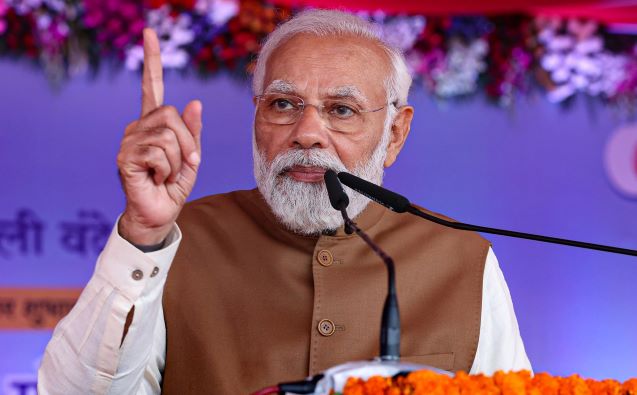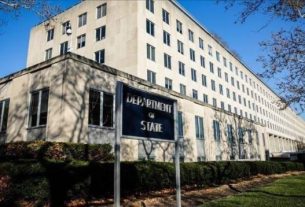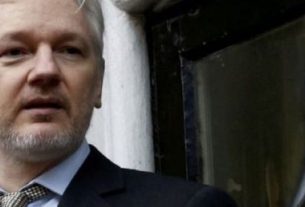New Delhi, India – Speaking to a saffron-clothed crowd of supporters in his home state of Gujarat earlier this week, Indian Prime Minister Narendra Modi turned to an increasingly favoured electoral theme – how opposition parties are collaborating with Muslims to plot a takeover of the nation.
“[The opposition alliance] is asking Muslims to do ‘vote jihad’. This is new because we have so far heard about ‘love jihad’ and ‘land jihad’,” said Modi, referring to a string of Islamophobic conspiracy theories, before emphasising to his audience why they needed to be fearful. “I hope you all know what the meaning of jihad is and against whom it is waged,”
As India’s giant national election nears its mid-point, with the third of seven phases of voting scheduled for May 7, Modi’s rhetoric against Muslims is growing shriller. That’s worrying analysts and even Muslims who backed the prime minister until recently but now fear that the rhetoric risks serving as oxygen for increased physical violence against Indian Muslims.
His latest remarks came after a local leader of the opposition Samajwadi Party, Maria Alam, addressed a gathering in the northern Indian state of Uttar Pradesh, asking Muslims to carry out a “jihad” of “votes”, as “that is the only jihad” that they could carry out to remove Modi from power. After Modi’s Bharatiya Janata Party (BJP) attacked her for the use of “jihad” in her speech, she clarified to the press that by “jihad”, Arabic for struggle, she was encouraging Muslim voter participation.
Modi, in his speech, however, suggested that a call for “vote jihad” was “dangerous for the country’s democracy”. Critics and opposition leaders, however, allege that the PM’s words, targeted against India’s 200 million Muslims, are what are troubling for India, especially in the middle of a tense election, in which 960 million voters have registered to cast their votes.
‘Infiltrators’, ‘invaders’, ‘looters’
In a campaign speech last week, Modi equated the Muslim community with “infiltrators” and described them as “those who have more children”, pandering to a popular Hindu majoritarian trope that Muslims produce more children, with the aim of eventually outnumbering Hindus in India. In reality, Muslims constitute less than 15 percent of the national population, and government data shows their fertility rate is going down faster than that of Hindus and other major religious groups.
Those comments set off a political row, inviting sharp criticism from the opposition and sections of civil society. Nearly 20,000 citizens wrote to the Election Commission of India to act against the accusations of hate speech by Modi.
Yet, two days later, on 23 April, Modi doubled down on his comments claiming a conspiracy hatched by the Congress — the country’s principal opposition party — and Muslims to steal Hindu wealth.
“I presented the truth before the nation that the Congress has hatched a deep conspiracy to snatch your property and distribute it among their special favourites,” he said, in reference to Muslims.
Then, on April 30, the BJP published an animated campaign video on Instagram, showing stereotypical portrayals of violent and greedy Muslim male raiders attacking medieval India and plundering her wealth, before Modi arrives to rescue the nation. The video again peddled the PM’s assertions that that the Congress, if elected, will distribute Hindu wealth and property among Muslims.
While former Congress Prime Minister Manmohan Singh had said, 18 years ago, that disadvantaged Indian communities, including Muslims, should have first access to national resources, the Congress campaign manifesto does not make any reference to taking wealth away from one community to give it to any other group. Other conspiracy theories that Modi has referenced publicly in recent days include the notions of ‘love jihad’ – that Muslim men are marrying women from other faiths in order to convert them to Islam – and ‘land jihad’ – that Muslims are hoarding land to gain control of the terrain of India.
None of this is surprising to Nilanjan Mukhopadhyay, a Modi biographer, who said that religious polarisation has been second nature to Modi for decades. “Indian democracy has been badly brutalised by the BJP and Modi,” he told Al Jazeera. “This is perhaps the worst time to be a Muslim in India today, who all the time now feel they are prisoners of their identity.”
While Instagram took down the April 30 video after multiple users reported it for hate speech, India’s election commission is yet to act on complaints against Modi, leading to criticism by opposition leaders.
“Modi has disgraced the dignity of the PM post; his words can never be words coming out of an Indian prime minister’s mouth,” said Congress legislator Pramod Tiwari, the leader of the opposition in the upper house of the Indian parliament.
“Democracy is at stake in these elections and the election commission of India is sleeping over it,” he said, speaking with Al Jazeera. “The Congress party calls for the disqualification of Modi’s candidature and he should be barred from campaigning.”
Al Jazeera reached out to three BJP spokespersons for a response to the allegations against Modi, but they did not comment.
‘Trigger more hatred’
Meanwhile, critics say that Modi’s “hateful remarks” have left Muslims more vulnerable to violence. “These remarks are likely to make the Hindutva workers feel vindicated due to support by the country’s highest office. They would feel the patronage,” said Irfan Engineer, director of the Mumbai-based Centre for Study of Society and Secularism. Hindutva refers to the Hindu-majoritarian ideology of the BJP and its ideological mentor, the Rashtriya Swayamsevak Sangh (RSS).
“I hope these remarks do not trigger more hatred and violence – but that’s a hope against hope.”
Engineer has monitored communal violence for decades and visited affected areas with fact-finding teams, he said, adding that “these kinds of speeches and rallies have sparked violence” in areas otherwise known for inter-religious harmony.
Amnesty International said it too was worried about the consequences of Modi’s remarks.
“Institutions created to monitor such speech during elections should be working to bring to account those responsible for such remarks, however, so far, we have only seen an unfortunate condoning of such incitement and hostility by the Election Commission of India,” said Aakar Patel, the chair of the board of Amnesty International in India, in a statement to Al Jazeera.
“This widespread impunity signals the extension and intensification of the systematic discrimination suffered by Muslims in India.”
Where Modi has previously portrayed himself as a victim of opposition attacks – alluding to his childhood in relative poverty as opposed to the privilege many opposition leaders grew up with, for instance – “this time, he has moved on from himself and instilled a victimhood in the entire Hindu community”, said Engineer.
“This is the ultimate point of the Hindu nationalist movement, where all Hindus are victims – and, therefore, you need a strong state with no place for democratic institutions, freedom of speech, or [freedom of] religion.”
‘Subsumed by the individual’
Research suggests that at least in some parts of India, Muslim support for the BJP, though tiny, is slowly growing. It went up from under 5 percent in 2012 to more than 9 percent in 2022, in Uttar Pradesh, India’s largest and most politically significant state.
Yet, Mukhopadhyay, Modi’s biographer, said even those Indian Muslims who have supported Modi are today vulnerable. “Modi will still come and attack Muslims,” he said.
That turned true for Usman Ghani, a young political leader from the northwestern state of Rajasthan. Ghani joined the student wing of the BJP during college and rose to become his district’s minority-wing president. A few months ago, he welcomed Modi during the state election campaign.
However, when he went for poll outreach, he said the voters made him respond to PM Modi’s remarks against the community, which he called “nonsense”. He was expelled from the party and then was detained by the local police in the BJP-ruled state.
“Modi is a bigger cult than anyone has ever been [in the Hindutva movement],” Mukhopadhyay said. “Is this an election or an individual glorification drive?”
“The Hindutva movement has been subsumed by the individual. And it is a great paradox because, for the Sangh [RSS] family, no individual is above the organisation.”
A New Delhi-based political commentator, who requested anonymity fearing repercussions to their work, said Modi’s focus on anti-Muslim fears could be a reaction to lower-than-usual voter turnouts in the first two phases of the national election. “Nobody is buying Modi’s economic development pitch any more, so he is, of course, polarising the voters.”
Yet, despite record-high unemployment, widening income and wealth inequality, and backsliding on democratic indices, polls position Modi as the favourite to return to power for a third time.
“If the 2014 mandate was for so-called development and the 2019 was for nationalism, now, in 2024, Modi will feel more confident that he won votes for polarisation,” Engineer said. “Anti-Muslim hate is now central to the BJP’s campaign.”__Al Jazeera





